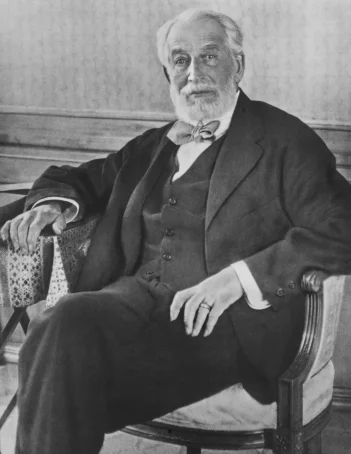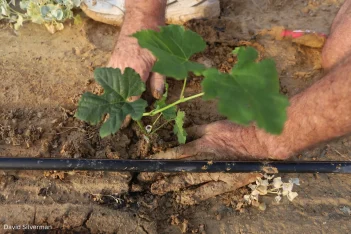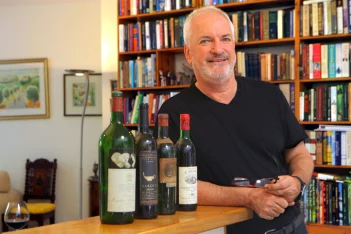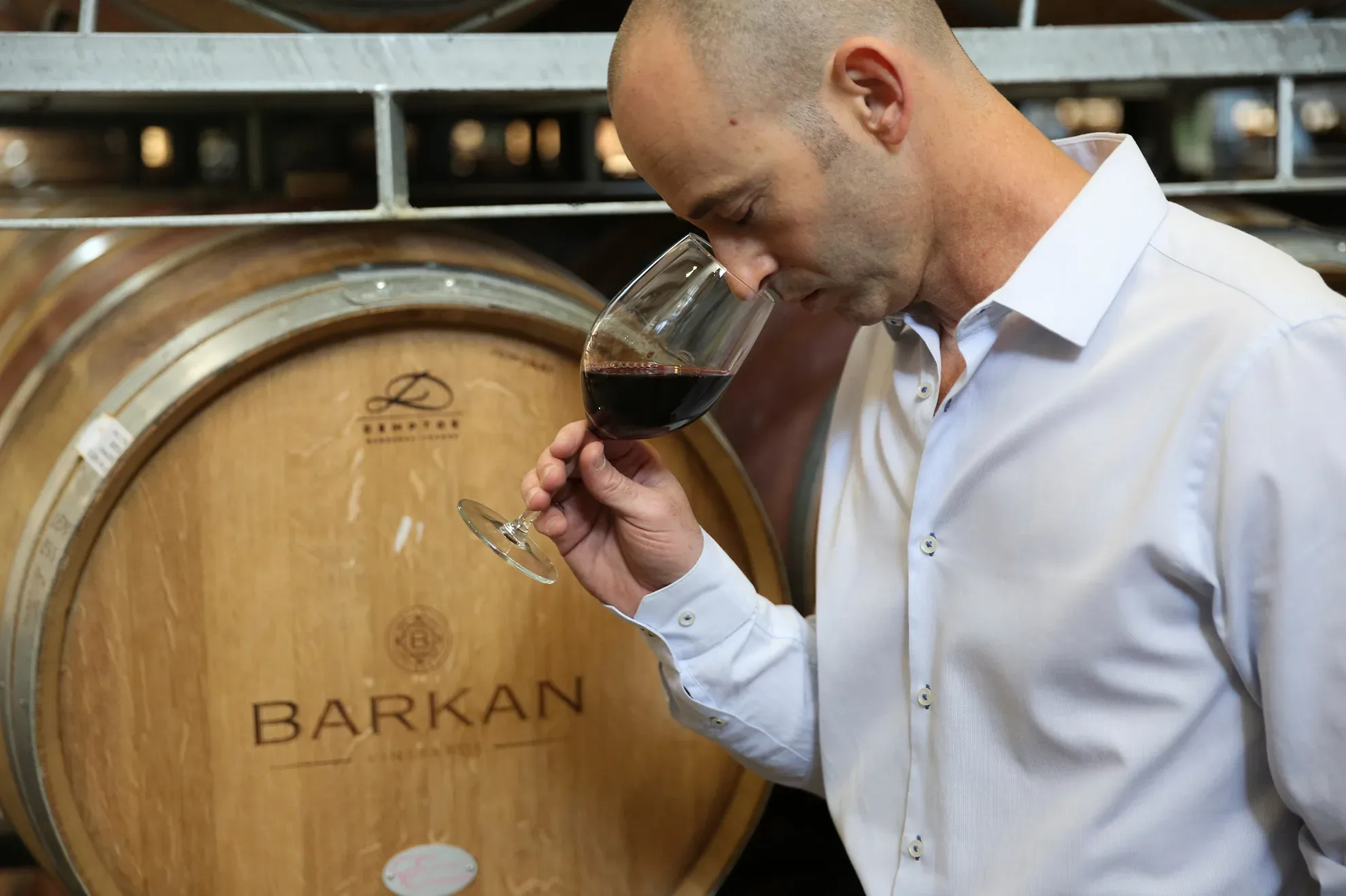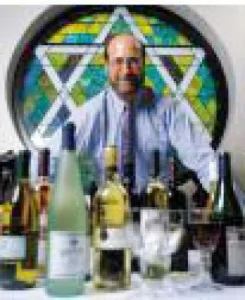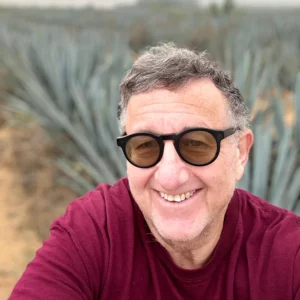The Institute of Masters of Wine is an exclusive, elitist club. There are only 409 Masters of Wine in the whole wide world. This is the cr?me de la cr?me or the Parthenon of wine. Think of all the winemakers, all the wine critics, and of all those in the wine trade. A few of them understand wine, right? Yet out of all these wine wannabes, only 409 have passed the rigorous tests, taken over a number of years, that give them the right to put the letters MW after their name. These giants of wine come from thirty different countries, and Israel is one of them!
Imagine my pride and delight, echoed all over the wine house of Israel, to hear that we have a new Master of Wine. The applause goes to Ido Lewinsohn, winemaker and father of two, who should be referred to, from now on, as Ido lewinsohn MW.
The first Israeli MW, then a cause for great celebration, was Eran Pick, winemaker and CEO of Tzora Vineyards.? Now Ido Lewinsohn, head winemaker of Barkan-Segal, the country?s largest winery, and owner-winemaker of Lewinsohn Winery, one of the leading boutique wineries in Israel, has been admitted into this prestigious group. It is not easy for a winemaker to become a Master of Wine. Winemakers tend to be too involved with their own wines, to absorb what is going on around the world to the extent required. Furthermore, it is extremely rare for the winemaker MW to be responsible for a winery producing 10 million liters a year! During his period of study, Lewinsohn married, had two children, became a loving and active father, joined the largest winery in Israel and succeeded to become a Master of Wine. Wow! This is someone who knows how to focus, concentrate and compartmentalize.
Ido Lewinsohn is basically a nice, decent sort of guy. He is respectful to his elders and kind to those that look up to him. A winemaking mensch. He is tall, slim with coat-hangar shoulders and a warm, friendly look and a ready smile. However, he skillfully conceals what he also has. That is a steel will to succeed. I sometimes feel there are two Lewinsohns within, fighting one another.? One is impulsive, instinctive, emotional and driven, but with an impeccable instinct, that is usually proven right. The other is more mature, judicious, more attentive to the surroundings and the people around him. The two wrestle like Jacob with the angel, but it is the combination of the two, that make Ido so potent and unique. He reminds me of a taught spring, full of latent drive and energy. He is an instinctive winemaker, with an acute awareness of marketing needs, indeed many will say he has a refined marketing touch. He is also a restless innovator, a pusher and hard on himself if he does not succeed in something right away.
There was no romance with wine, or memories from his youth that pushed him into wine. He simply decided after serving in the army that he would study wine. That is Ido: impetuous, but full heartedly following his uncanny, gut feeling. His first harvest was as long ago as 2002. Along the way, he studied Viticulture and Enology in Milan, and gained experience at different wineries in Tuscany, Languedoc, the Rhone Valley and Tasmania. He interned a San Guido?s Sassicaia, a great name in wine, and also worked a harvest at Margalit Winery in Israel.
In 2005, at the young age of 27, he found himself as winemaker of the Mas du Notaire, in the Costieres de Nimes appellation of the Rhone Valley. Here he found himself with responsibility beyond his years and he had to do everything. It was a fraught time, but an important learning stage in his development.
He joined Recanati Winery in 2007. No doubt that there was a distinct turnaround in the quality and image of Recanati Winery, which began after he arrived. By the time he left at the end of 2016, Recanati was in a totally different place. He saw no point in Israel becoming known for Cabernet and Merlots, and led the way with a move to Mediterranean varieties. He was not the first to do this. Vitkin Winery and Assaf Paz were the pioneers and Carmel also then had a Mediterranean bent.
The story surrounding the Recanati Wild Carignan sums everything up. Lewinsohn came across a vineyard of unappreciated, uninspiring Carignan bush vines in the Judean Foothills. Whereas most wine people would have seen a sad vineyard, Ido saw the potential for a revived vineyard, a unique wine and a story. The winery supported him, offering Cabenet Sauvignon from another vineyard to the grower, so Lewinsohn could secure this particular Carignan. The resulting wine was high quality and the Recanati Wild Carignan received the greatest international recognition ever received for an Israeli wine made from this variety. Berry Bros. of London bought the wine, and Recanati became the first Israeli winery sold by arguably the oldest and most famous wine shop in the world.
Then Recanati became the first winery to make a varietal Marselan, an oleh hadash that has settled in particularly well here. The Marsanne Roussanne Special Reserve White followed. It was the first time a winery chose varieties other than Chardonnay or Sauvignon Blanc for their prestige white. Lewinsohn was also the first Israeli winemaker to make Marawi. This is a variety known to Palestinians as Hamdani. The wine was a joint venture between a Palestinian grower near Bethlehem, an Israeli winemaker on the Mediterranean coast and an indigenous Holy Land variety. Basically, it was a unique and wonderful combination and the world media?s ears pricked up. The launch of the wine received unprecedented international coverage.
Ido Lewinsohn was involved in the heart of these decisions at Recanati Winery, where he initiated his ideas and was permitted to implement them. Of course, success has many fathers, and the winery itself and head winemaker must also take credit, but just because Lewinsohn has moved on, does not mean his part should be airbrushed from history.
In recognition of his influence and success, Ido Lewinsohn was promoted to co-head winemaker of Recanati Winery. However, when Barkan?s veteran winemaker Ed Salzberg retired, Ido was head hunted and became head winemaker of this 13 million bottle winery in 2017. There, he had four winemakers and five agronomists in his team and became responsible for two brands, Barkan and Segal, that both make wines at every price point. It was a big change for a hands-on winemaker!
Under Lewinsohn?s stewardship, Segal began to introduce new wines made in innovative ways. Brands were named after the method of winemaking. Labels were launched that were called Free Run, Wild Ferment and Whole Cluster, which were added to the Unfiltered.? The Free Run Merlot, Wild Ferment Chardonnay and Whole Cluster Pinot Noir are my favorites of these. As for Barkan, Lewinsohn has produced a label for restaurants, called Beta, including a lovely cherry-berry Argaman, a fragrant Colombard and a flowery Marawi (to date the best Marawi I have tasted.) All are of interest to the curious wine lover, they each have a freshness and drinkability and they represent both quality and great value.
The intention is that Barkan will be the international winery and that Segal will be the Israeli, ?wild? winery. However, they have some work to do.? Barkan?s labels range from the economy level Premieur, to the entry level Classic, then there is Reserve, Reserve Gold Edition, Assemblage, Beta, Special Reserve Winemaker?s Choice, Altitude, up to the prestige label Superieur. The Segal labels range from the entry level Segal?s Wine, Ben Ami, Fusion, Free Run, Wild Ferment, Whole Cluster, Rechasim Single Vineyard, Petit Unfiltered, up the prestige Unfiltered. A mish mash of names and overlapping wines. The confusion extends to the name of the winery. In different places, you will find Barkan Wine Cellars, Barkan Vineyards and Barkan Winery. I chose to use Barkan-Segal for the purposes of this article. Whatever its correct name, Barkan-Segal is a sales powerhouse, and very strong in the mass market and in export sales. Paradoxically, this strength is also their weakness, because they are less attentive to building an image of style and quality. If you are selling anyway, why bother? Anyway, this empire has more unfulfilled potential than any other winery. Hopefully the pride of having a Master of Wine will inspire them. To their credit, some of the changes have been promising. I love some of the new wines being produced. It is a great start, and it will be an exciting place to observe over the next few years.
Ido Lewinsohn also founded a tiny family winery in 2007. Lewinsohn Winery began as a genuine garagiste, because it was situated in his father?s garage. The brand ?Garage de Papa? is well respected for an exquisitely balanced Chardonnay, a super juicy Med blend with great depth and complexity, which is these days focusing more on Syrah, and also a whole cluster Petite Sirah. In all they now make 25,000 bottles and this winery is regarded as one of the leading boutique wineries in Israel.
It is possible that employing a young winemaker called Ido Lewinsohn, was the best investment by Tempo, the parent company of Barkan-Segal. They have really received more than they bargained for. Let?s hope they are smart enough to make use of this pearl that has fallen into the laps.
The effect of Ido Lewinsohn becoming a Master of Wine is far over and above any parochial winery. It is an event on a national scale and the credit belongs to Ido Lewinsohn alone. It is a massive recognition and further raises the profile of Israel as a quality wine producing country. I have been around a long time, but even so, I was as excited as a little boy when I heard the news. Bravo Ido!
The writer, a wine trade veteran, has advanced Israeli wine for nearly 35 years. He is referred to as the English voice of Israeli wines. www.adammontefiore.com












